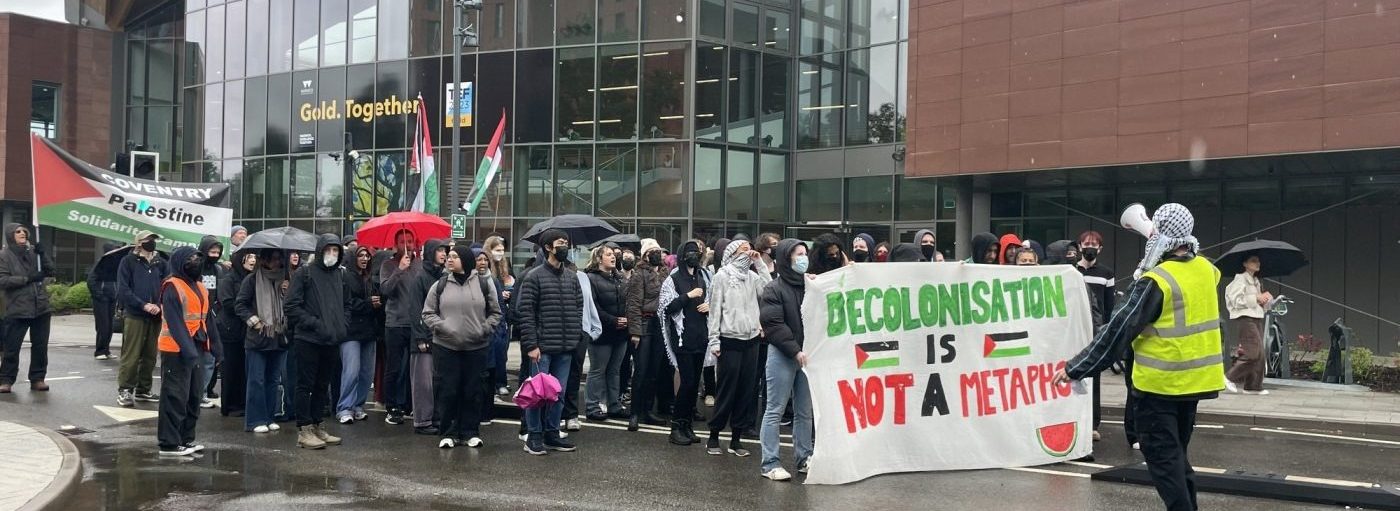Addressing responses to Warwick Kehillah’s Kabbalat Shabbat services – and a retrospective on our growing community of solidarity.
Over the past month, Warwick Kehillah has been regularly holding Kabbalat Shabbat services at the Warwick Palestine solidarity encampment. These events have been a highlight of the week for many, as a time for reflection and community as people from all Jewish and other faiths come together in solidarity and unity with the liberation of all people. After the service, members of the local community bring a delicious Shabbat meal of hot food. We chat about the past week, our hopes and plans, and bond in our community and purpose, and we eat as the sun sets and the candles burn short. Some Jewish students who have not previously been involved in the Palestine solidarity movement on campus attended our events, finding it an “inclusive and welcoming environment” and a “beautiful community event”.
We are delighted to have been given such a comprehensive liturgical review of our Kabbalat Shabbat service. Kabbalat Shabbat is such a beautiful and communal service and we always find joy in talking about it and learning about it with other people. Not everyone has the same level of knowledge regarding the structure of services, and we welcome all levels of experience, observance, and people from all denominations and backgrounds.
As Jewish people, we are always taught to learn and examine things from new angles
As Jewish people, we are always taught to learn and examine things from new angles – if the author contacted us directly we would have accepted recommendations with open arms. Our protest liturgy is ever-expanding and evolving as circumstances change and our campus and global movement grows. For example, the omission of verses from Lecha Dodi and keeping only 4 verses (Shamor V’Zachor, Likrat Shabbat, Hitoreri and Boi V’Shalom) is what many reform congregations around the world practice; this is just something that the author has not encountered and not enquired about.
Similarly, the Jewish Prayer for Nakba Day was misattributed in the article to a non-Jewish writer, Sarah M Saleh. In reality, it was written by an anonymous ‘Sarah M’, a Jewish Israeli medical student, to their blog and published on the open siddur website. Sarah’s family migrated from the Tsar’s Pale of Settlement to the US, and eventually to Israel. This kind of query would have been far easier discussed with a constructive conversation either in person or via social media.
We envision an approach to Judaism grounded in our radical traditions of questioning everything, transgressing norms, and liberation
In Warwick Kehillah, we envision an approach to Judaism grounded in our radical traditions of questioning everything, transgressing norms, and liberation. Us being open to all genders, not just men, to constitute a minyan is not a rejection of Judaism, but building the Jewish tradition into a more egalitarian one, as many denominations have done for generations.
The writer interestingly fixates on the translation of ‘Israel’ within the liturgy as ‘G-d-Wrestlers’, even when it is not traditionally applied. This translation emerged from Rabbi Arthur Waskow and the civil rights movement. Waskow was associated with the ‘Jewish Renewal’ movement, which was known for reintroducing “ancient Judaic traditions of mysticism and meditation, gender equality and ecstatic prayer” to synagogues. This trans-denominational approach of inclusivity and equality is one of many which inspires us today. Rabbi Waskow was known for starting the ‘freedom seders’ in the US civil rights movement, which united Black communities and Jewish communities in the struggle for liberation. In its first seder in the late 1960s, over 800 people from all backgrounds were united by the Passover story of liberation, and its application in the movement for civil rights. These bonds of solidarity must be continually forged and reforged between our communities, and Warwick Kehillah’s events at the encampment have been playing a role on campus in continuing the tradition of solidarity and liberation from the US civil rights movement into the present and the future. This is more crucial than ever in the present, as tens of thousands of Palestinians have been killed by the brutal Israeli regime, with millions displaced in Gaza. This is while Israel claims to represent the entire Jewish tradition, in all its diversity. Jews around the world are campaigning for justice, building community, and expressing solidarity with the Palestinian people. Our movement is continually growing; now is the time to join us.
We are so excited and proud to be part of building a true interfaith and intercultural community grounded in the liberation of all people
We welcome all Jewish students who want to be a part of this tradition and are more than happy to answer any potential questions or concerns. Simply message us on Instagram or come to one of our events if you would like to get involved! We plan to continue hosting our Kabbalat Shabbat services in unity with Jewish groups at the encampments across the UK and the US along with more brilliant teach-outs. Last week’s teach-out on the radical Jewish tradition was a resounding success, connecting Jewish students with a socialist heritage many may not be aware of, and informing a largely non-Jewish encampment on the history of Jewish radical socialism and anti-zionism. We will continue to run these events this term and into the next year, and seeing growing Jewish participation in these events every week has been heartening. We are so excited and proud to be part of building a true interfaith and intercultural community grounded in the liberation of all people.
After attending one of our services, a local author noted: “A lovely moment today watching a Jewish young man and a Muslim woman chatting away at the encampment for a Free Palestine at Warwick University. She had brought food and we all shared Shabbat. True solidarity.”
We have also attached an example poem, prayer, and song from our service here. 6 These are included alongside traditional Brachot and songs.

Comments